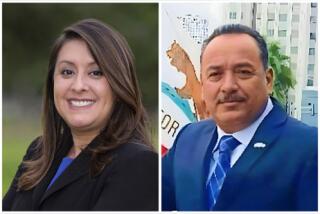Covina Election Turns on Quality of the Air
- Share via
COVINA — Poor air quality and the question of waste-to-energy plants appear to be the major concerns in the April 8 election as two challengers take on the incumbents in a race for two seats on the City Council.
All of the candidates agree that the air quality is unacceptable, but have differing views on the effect that several proposed waste-to-energy plants might have on the environment.
Pay Is $300 a Month
Incumbents Robert Low and Henry Morgan, both two-term veterans, are facing Nathalie Leone and Steven Romines. Council members serve four-year terms and are paid $300 a month.
Low, 55, who teaches social studies at Mark Keppel High School in Alhambra, said he fears that nearby waste-to-energy plants, including one in Irwindale, would add pollutants to the already dismal air quality in Covina. He said the Irwindale plant alone would burn about 3,000 tons of trash a day and that pollutants would tend to fall to the northeast, toward Covina.
Late last year, the Covina council unanimously passed an informal resolution opposing waste-to-energy plants in the area until the San Gabriel Valley meets federal air-quality standards. Covina air quality fails to meet federal standards 135 days out of the year, said Ron Ketcham, a spokesman for the South Coast Air Quality Management District.
“We have one of the worst air pollution problems in the country,” insisted Low. “I think we have too much smog and we don’t need any more.”
Morgan, 58, a salesman for IBM, said that although he is concerned about the city’s smog problem, he is not ready to condemn waste-to-energy plants until he sees scientific evidence that they will further damage Covina’s air quality. Equally important, he said, is the issue of trash disposal in general.
“We’ve got to solve the trash problem and we’ve got to solve the air-quality problem,” said Morgan. “You’re not solving any problems by telling them not to build trash-burners. What are we going to do with it? Who’s going to take it?”
30-Year Resident
Challenger Leone, 63, who has lived in Covina for 30 years and who has served on the council’s housing and community development committee, agreed that air quality in the area is a problem. “We need to make it safe for the citizens, and especially for the children who will have to live here in the future,” she said.
Romines, a 37-year-old business executive, said he would like to see more research done on the potential effects the refuse burners would have on Covina. “I would like to investigate some alternatives,” he said. “My biggest concern is whether it would blow into our area and make the quality of our air worse.”
Romines has never run for public office. But he said he was active in Costa Mesa before he moved to Covina four years ago and is eager to get involved in community work again. Covina’s “hometown atmosphere,” he explained, inspired him to run.
“I had never experienced that before,” Romines said in his Diamond Bar office.
If elected, Romines said he would push to have some local government services, such as garbage collection, contracted out to private firms as a way to cut costs. “It eliminates the payroll expenses initially, and all the related expenses,” Romines said.
“I’m a conservative by nature. I don’t believe in a lot of government,” he added.
If elected, Leone will be the first woman to serve on the council since 1978. She said she has become involved in trying to solve the problems of senior citizens. “I’m one of them,” she said.
One of Leone’s major concerns is the lack of affordable housing for the elderly and handicapped. She said it costs about $400 a month to rent a relatively modest one-bedroom apartment in Covina, and that the average Social Security check totals about $460. “A lot of people fall into that slot,” she said. “That is just beyond the means of a lot of people.”
Leone, a retired real estate agent and boutique owner, said she thought she could help provide more of a balance on the council. “Some of the councilmen are in tune with the wishes of the people, whereas the other councilmen are with big business,” she said.
Morgan, who has lived in Covina for 28 years, describes himself as “pro-development” and insists that “development is the lifeblood of becoming independent of federal and state funds.”
Tax revenues from local businesses, he said, can be used to help clean up the deterioration and “blight” of the community. “It’s absolutely essential,” Morgan said. “Our city is deteriorating and we have to take action.”
Romines agrees. “We have to have an attractive atmosphere for the business community,” he said.
Low said he thinks the council sometimes overlooks “the needs of the people.” He said he opposed a recent decision by the council to combine the Covina and West Covina fire departments and thinks road repairs should have a higher priority.
Voter turnout in Covina City Council elections has generally been low, rarely surpassing 19% of the 20,608 eligible voters, said City Clerk Frieda C. Richardson. With only two council seats open and no propositions on the ballot, she does not expect this election to be any different.
“The turnout has been very poor compared with general elections,” Richardson said. “We have to have a controversial issue to get it up to 25%.”
More to Read
Sign up for Essential California
The most important California stories and recommendations in your inbox every morning.
You may occasionally receive promotional content from the Los Angeles Times.














